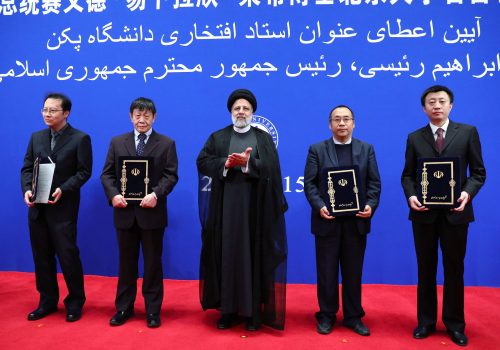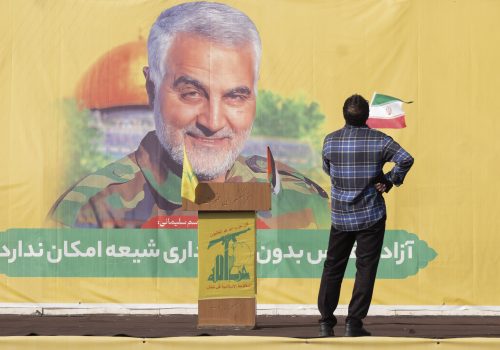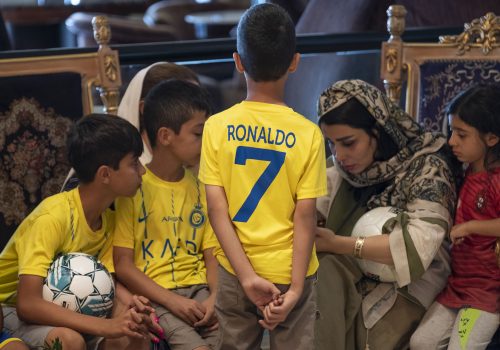A year ago, Beijing brokered an Iran-Saudi deal. How does détente look today?
Top Iranian and Saudi security officials met in Beijing on March 10, 2023 to begin a new chapter in bilateral affairs following sky-high tensions. The neighbors in the Persian Gulf signed a deal to restore full-fledged diplomatic ties and reactivate a 2001 security cooperation agreement. The absence of any US or European role—combined with Iraqi, Omani, and Chinese mediation that made this diplomatic breakthrough possible—spoke volumes about what one Emirati political scientist described as the new “post-American Gulf era.”
Iran re-opened its embassy in Riyadh, and Saudi Arabia resumed diplomatic operations in Tehran in June and August 2023, respectively. In September 2023, the new Iranian ambassador to Saudi Arabia, Alireza Enayati, arrived in Riyadh on the same day the kingdom’s new envoy to Iran, Abdullah Alanazi, began his diplomatic duties in Tehran.
Given how hostile Iranian-Saudi relations were in the years leading up to the March 2023 agreement, such restoration of diplomatic ties was significant. Until a year ago, there were no diplomatic relations between the two countries since Riyadh severed ties with Tehran in January 2016, in response to attacks on Saudi diplomatic missions in Tehran and Mashhad following the execution of Shia cleric Nimr Baqir al-Nimr. The Saudi state’s killing of this cleric raised sectarian temperatures in the Middle East. It drastically heightened friction in Tehran-Riyadh relations, which had steadily deteriorated against the backdrop of armed conflicts and political crises in Bahrain, Iraq, Lebanon, Syria, and Yemen in the aftermath of the 2011 Arab Spring.
The “Neighbors First” foreign policy strategy of the Ebrahim Raisi administration seeks to lessen the impact of Western pressure on Tehran by improving its relationships with surrounding countries. Within this context, Tehran’s leadership is focused on overcoming problems with some members of the Gulf Cooperation Council (GCC), including the United Arab Emirates (UAE). To show solidarity with Riyadh, the UAE downgraded its relations with Tehran amid the 2016 Iranian-Saudi crisis. But by 2019, Abu Dhabi began cautiously engaging Iran diplomatically due to the ways in which Iran’s “maximum resistance” to Washington’s maximum pressure policy left the UAE vulnerable due to “sabotage operations” off the Emirati coast. Then, in 2022, there was a formal restoration of ties after Abu Dhabi’s assessment that long-term peace and security in the Persian Gulf would require dialogue.
As Tehran sees it, better relations with GCC states—particularly a major player in the Arab and Islamic world, such as Saudi Arabia—could, to some extent, help Iran emerge from isolation.
SIGN UP FOR THE THIS WEEK IN THE MIDEAST NEWSLETTER
Reduced tensions with Iran offer Saudi Arabia opportunities to achieve the stability and security necessary for the kingdom to reach its internal development goals. Vision 2030, Saudi Arabia’s grandiose plan for economic diversification away from oil, requires massive levels of investment in various non-oil sectors such as tourism, logistics, ports, entertainment, culture, and defense.
When Iran and Saudi Arabia had no diplomatic ties, economic relations between the two Persian Gulf countries were basically nonexistent. Yet, just five weeks after the recommencement of ties, a director at Iran’s Trade Promotion Organization expressed optimism about bilateral trade reaching $1 billion in the short term, and twice that much in the medium term, through Saudi and Iranian exports. As of April 2023, Iran had exported $14 million worth of steel to Saudi Arabia throughout the preceding three months. Realistically, however, US sanctions on Tehran will limit the potential for Iranian-Saudi bilateral trade to grow, even if both sides would like a fruitful economic relationship built on the détente.
The Saudi leadership understands that Iran and Tehran-backed non-state actors in the region can threaten the kingdom’s national security in ways that greatly reduce Vision 2030’s chances of success. For starters, there were drone and missile strikes against the Abqaiq and Khurais oil facilities in September 2019. Those attacks, which Riyadh blamed on Tehran, reduced Saudi Arabia’s oil production by 50 percent. Additionally, it’s difficult to forget the 2022 Houthi rebel missile strike against a fuel depot in Jeddah during the Formula One Grand Prix at a time that was important to Riyadh’s efforts to present Saudi Arabia to the world as a stable country with up-and-coming sports and entertainment industries.
The March 2023 agreement has reportedly led Tehran and Riyadh to make concessions. Iran apparently agreed to stop encouraging Houthi rebel attacks against Saudi Arabia though Tehran has not been able to control their decision-making in the war. Iran called on Saudi Arabia to cut off its alleged funding to Iran International. The London-based Persian-language television channel—which provided day-to-day news coverage of Iranian authorities’ human-rights violations following Mahsa Amini’s September 2022 death in police custody and the anti-establishment protests it prompted—became an issue in Iran-Saudi relations due to its ties to a Saudi businessman. Iran also asked Saudi Arabia to stop supporting militant Sunni groups operating in its Sistan and Baluchestan province, such as Jaish al-Adl, ethnic Arab separatist forces in Khuzestan, and the Mujahedin-e Khalq. By May 2023, Saudi Arabia renormalized diplomatic relations with the Bashar al-Assad government in Syria, a move that was possibly related to the diplomatic deal with Iran.
The Gaza war factor
Pragmatism, not love, drove Iran and Saudi Arabia to recommence diplomatic relations a year ago. Tehran and Riyadh saw dialogue as the only viable way to reduce tensions, and realized that further escalating hostilities would not advance either’s national interest.
Despite the March 2023 agreement, there is no denying that Tehran and Riyadh remain extremely suspicious of each other. The Islamic Republic still views the Saudi-US partnership as a grave threat to Iran. Meanwhile, the Iranian regime’s revolutionary ideology and Tehran’s ability to challenge the regional status quo through its networks of non-state actors across multiple Arab countries continue to concern Riyadh. Within this context, détente, not rapprochement, most accurately describes the current period in Iranian-Saudi relations.
The five-month-old Gaza war has reverberations in Lebanon, Yemen, the Red Sea, and the Gulf of Aden, which subjects the Middle East to much danger. Nonetheless, this war’s regionalization has not derailed the Iranian-Saudi détente. On the contrary, Tehran and Riyadh have taken steps to ensure that their dialogue continues without the March 2023 diplomatic deal becoming another victim of the Gaza war. That the détente has weathered the Israel-Hamas conflict since October 7, 2023 suggests that there is far more depth to it than some analysts might have suspected a year ago.
To some extent, the Gaza war has brought about a degree of Iranian-Saudi alignment while pushing the two countries toward deeper diplomatic engagement. Four days into the war, Iranian President Raisi and Saudi Crown Prince and Prime Minister Mohammed bin Salman had their first phone conversation since their countries restored diplomatic ties. In the call, they agreed on the “need to end war crimes against Palestine” and promote stronger Islamic unity. Then, on November 11, 2023, Raisi came to Riyadh to address the joint Arab League-Organization of Islamic Cooperation (OIC) emergency summit on Gaza, making him the first Iranian president to visit Saudi Arabia since Mahmoud Ahmadinejad attended the 2012 OIC summit in Mecca.
Opportunities that may be lost
For Iran, the region’s post-October 7, 2023 crises have represented opportunities to build on Tehran’s détente with Riyadh, convince the Saudis to end any consideration of joining the Abraham Accords, and advance a narrative about Iran possessing much influence throughout the Islamic world while aligning with its Arab neighbors against Israel.
Saudi officials have been keen to avoid any actions amid the Gaza war and its regionalization that could harm the détente with Iran. This contributes to Riyadh’s absence from Operation Prosperity Guardian and its concerns about US-United Kingdom (UK) military strikes against the Houthis in Yemen. Saudi Arabia also appears to be among the Arab states that has reportedly started restricting the US military’s ability to wage operations against Iran-backed militias in the Middle East from its soil, according to Al-Monitor.
Looking ahead into the Iranian-Saudi détente’s second year, Tehran and Riyadh will be keen to find ways to build on what is essentially a non-aggression pact. Although it is practically impossible to imagine Iranian-Saudi relations being free of deep-rooted suspicions and high levels of distrust, Tehran and Riyadh can find ways to responsibly “share” the neighborhood, as then President Barack Obama put it eight years ago.
Nonetheless, as the Gaza war continues, Saudi officials will remain nervous about how Iran-backed groups in the region might act toward the kingdom. This risk adds to Riyadh’s unease about Israel continuing its war on Gaza and Saudi Arabia’s frustration with the United States for refusing to pressure Israeli Prime Minister Benjamin Netanyahu’s government into accepting a ceasefire. If regional tensions spiral further out of control, and Saudi Arabia becomes caught up in the crossfire, the nascent détente could come into question.
Giorgio Cafiero is the chief executive officer of Gulf State Analytics, a Washington, DC-based geopolitical risk consultancy, and an adjunct assistant professor at Georgetown University.
Further reading
Wed, Feb 22, 2023
Iran’s economic future is uncertain. It’s no surprise why Raisi visited China.
IranSource By Jonathan Fulton
From February 14-16, Iranian President Ebrahim Raisi was in Beijing for his first foreign trip of the year and the first official visit to China for an Iranian leader in twenty years.
Wed, Nov 8, 2023
The Gaza war raises questions about the future of Iran’s Resistance Axis
IranSource By
The Gaza war presents the first significant test of the level of cooperation present among the elements of the Iran-led Resistance Axis.
Thu, Sep 28, 2023
Ronaldo’s visit to Iran was a temporary reprieve from the realities on the ground
IranSource By Hezha Barzani
The timing of the match is what stood out the most, as it took place two days after the one-year anniversary of the anti-establishment protests.
Image: Hassan Zarnegar, Charge of Consular Affairs in the Iranian embassy, and Saudi Ali al-Youssef, Director of Consular Affairs at the Ministry of Foreign Affairs, attend a ceremony for the reopening of the Iranian Embassy in Riyadh, Saudi Arabia, June 6, 2023. REUTERS/Ahmed Yosri


